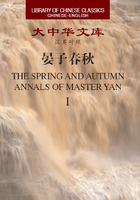
2.20 [45] 景公路寝台成逢于何愿合葬晏子谏而许
齐景公修成路寝台,逢于何希望父母合葬,晏子进谏而被准许
【原文】
景公成路寝之台,逢于何遭丧,遇晏子于途,再拜乎马前。晏子下车挹之,曰:“子何以命婴也?”对曰:“于何之母死,兆在路寝之台牖下,愿请命合骨。”晏子曰:“嘻!难哉!虽然,婴将为子复之,适为不得,子将若何?”对曰:“夫君子则有以,如我者侪小人,吾将左手拥格,右手梱心,立饿枯槁而死,以告四方之士曰:‘于何不能葬其母者也。’”晏子曰:“诺。”遂入见公,曰:“有逢于何者,母死,兆在路寝,当(如之何)〔牖下〕?愿请合骨。”公作色不说,曰:“〔自〕古(之)及今,子亦尝闻请葬人主之宫者乎?”晏子对曰:“古之人君,其(室宫)〔宫室〕节,不侵生(民)〔人〕之居,〔其〕台榭俭,不残死人之墓,故未尝闻诸请葬人主之宫者也。今君侈为宫室,夺人之居,广为台榭,残人之墓,是生者悉忧,不得安处,死者离易,不得合骨。丰乐侈游,兼傲生死,非人君之行也。遂欲满求,不顾细民,非存之道〔也〕。且婴闻之,生者不得安,命之曰蓄忧;死者不得葬,命之曰蓄哀。蓄忧者怨,蓄哀者危,君不如(详)〔许〕之。”公曰:“诺。”晏子出,梁丘据曰:“自古及今,未尝闻求葬公宫者也,若何许之?”公曰:“削人之居,残人之墓,凌人之丧,而禁其葬,是于生者〔无〕施,于死者无礼。《诗》云:‘谷则异室,死则同穴。’吾敢不许乎?”逢于何遂葬其母路寝之牖下,解衰去绖,布衣縢履,玄冠芘武,踊而不哭,躃而不拜,已乃涕洟而去。
【今译】
2.20 [45] DUKE JING COM PLETED THE TERRACE OVER THE ROAD BEDCHAM BER. PENG YUHE W ISHED TO BURY HIS PARENTS TOGETHER. YANZI REMONSTRATED AND PERM ISSION WAS GRANTED.[1]
Duke Jing completed the terrace over the Road Bedchamber. Peng Yuhe,[2] who was experiencing the loss of a loved one,met Yanzi on the road and bowed twice in front of his horses. Yanzi stepped down from his carriage,folded his hands in salute,and said: “What is it that you command me to do,Sir?”
Peng Yuhe replied: “M y mother died and the gravesite is below the wall[3] of the terrace over the Road Bedchamber. I would like to ask the Duke to issue an order allow ing me to mingle her bones with those of my father.”
Yanzi said: “Oh! That is very difficult! Even so,I w ill report the matter to him for you. And if,by chance,you are not granted permission,what would you do?”
Peng Yuhe answered: “A man of noble character would have the means to act; a man like myself is merely a person of no account. I would hold the cross-pole of the hearse w ith my left hand and beat upon my heart w ith my right hand,stand and starve until I w ithered and died,in order to make it clear to the officers of all four quarters: ‘Yuhe is a person who was unable to bury his mother.’”
Yanzi said: “Very well.” Thereupon,he went to his audience with the Duke and said: “There is a man named Peng Yuhe; his mother died and her gravesite is situated below the wall of the Road Bedchamber. I would like to ask for your permission to let him mingle the bones.”
The Duke’s facial expression revealed his displeasure and he said: “From antiquity until today,have you ever heard of anyone asking to conduct a burial on the grounds of the sovereign’s palace?”
Yanzi answered: “The palaces and the halls of the rulers of ancient times were modest and did not encroach upon the dwellings of the people living in them.[4] Their terraces and terrace-halls were modest and did not harm the tombs of the dead. That is why no one has ever heard of someone asking to be allowed to conduct a burial in the grounds of the palace of the sovereign. But now you,my Lord,are building palaces and halls extravagantly,and you rob the people of their dwellings. You build terraces and terrace-halls on a grand scale and destroy the tombs of the people. The living are aggrieved and worried and cannot live in peace,while the dead are separated from each other and their bones cannot be m ingled. An excess of pleasure and extravagant excursions and show ing haughty disregard for the living and the dead alike are not a ruler’s proper conduct. Follow ing one’s desires and satisfying one’s own demands w ithout caring for the common people is not the way to survive. Furthermore,I have heard that if the living cannot obtain peace of mind,this is called ‘accumulating sorrow.’If the dead cannot be buried,this is called ‘accumulating grief.’ He who accumulates sorrow will inspire resentment; he who accumulates grief w ill be in peril. My Lord,it would be better to permit his request.”
The Duke said: “Very well.” A fter Yanzi went out,Liangqiu Ju said: “From antiquity until the present day,I have never heard of anyone asking to conduct a burial in the grounds of the palace of his Duke. Why did you permit it?”
The Duke said: “Cutting off the dwellings of the people and destroying their tombs,humiliating people in mourning and preventing burials means not granting favors to the living and not perform ing the rites for the dead. As it says in the Odes:
‘During their lifetime they lived in separated chambers,
But in death they were buried in the same grave.’[5]
How would I presume not to perm it this?” Thereupon,Peng Yuhe buried his mother under the wall of the Road Bedchamber. He took off his mourning garment and removed the mourning band. He clad himself in plain clothes and wore straw sandals and a dark hat w ith white ribbons. Then,w ithout weeping,he stamped on the ground and beat his breast w ithout bow ing. When he had finished w ith this,he burst into tears and left.
注释
[1]Item 2.20 [45] ↔ Item 7.11 [181].
[2]An unidentified figure.
[3]牖→墉 (JS,150/5).
[4]For an identical view of the w ay the ancients built their dwelling houses,see Mozi,1.6/20-27.
[5]Shijing,73/33/28.